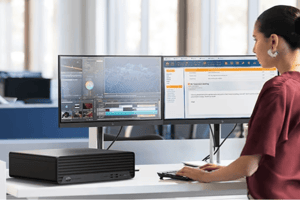Podcast
Questions and Answers
What is the Full Form of CPU?
What is the Full Form of CPU?
- Computer Processing unit
- Computer Principle Unit
- Central processing unit (correct)
- Control Processing Unit
What was the primary function of the first computers?
What was the primary function of the first computers?
performing numerical calculations
What type of computers use continuous physical magnitudes to represent quantitative information?
What type of computers use continuous physical magnitudes to represent quantitative information?
analog computers
When did the modern era of digital computers begin?
When did the modern era of digital computers begin?
What era saw the rise of personal computers and the Internet?
What era saw the rise of personal computers and the Internet?
What type of information can computers process?
What type of information can computers process?
What was the impact of the personal computer revolution?
What was the impact of the personal computer revolution?
In which fields are computers commonly used?
In which fields are computers commonly used?
What is a limitation of computers compared to humans?
What is a limitation of computers compared to humans?
What is an ethical concern related to computers?
What is an ethical concern related to computers?
How have computers impacted society?
How have computers impacted society?
What advancements can we expect in computer capabilities in the future?
What advancements can we expect in computer capabilities in the future?
What has been the overall effect of computers on our world?
What has been the overall effect of computers on our world?
Flashcards are hidden until you start studying
Study Notes
Central Processing Unit
- "CPU" stands for Central Processing Unit
- The CPU is the brain of a computer
- It is responsible for executing instructions and performing calculations
Early Computers
- The first computers were primarily used for complex calculations
- These calculations were often related to scientific research, engineering, and military applications
Analog Computers
- Analog computers use continuous physical magnitudes to represent quantitative information
- Examples of analog computers include thermometers, speedometers, and slide rules
- These were prevalent before digital computers
- They are still used in specific applications, such as control systems and signal processing
Modern Era of Digital Computers
- The modern era of digital computers began in the 1940s
- This was marked by the development of the Electronic Numerical Integrator and Computer (ENIAC)
Personal Computer Revolution
- The 1980s saw the rise of personal computers and the Internet
- This led to a widespread adoption of computers in homes and businesses
- It revolutionized communication, information access, and entertainment
Computer Processing
- Computers process various types of information, including text, numbers, images, audio, and video
- They can also manipulate and analyze this data to generate insights
Personal Computer Revolution Impact
- The personal computer revolution had a significant impact on society
- It democratized access to information and technology
- It fostered innovation in various fields, including education, healthcare, and entertainment
Fields of Computer Usage
- Computers are now ubiquitous and utilized across a wide range of fields, including:
- Science and Engineering
- Healthcare
- Business and Finance
- Education
- Entertainment
- Communication
- Manufacturing
- Transportation
Limitations of Computers
- While powerful, computers have limitations compared to humans
- They lack the capacity for independent thought, creativity, and emotional intelligence
Ethical Concerns
- The development and use of computers raise ethical concerns such as:
- Privacy
- Security
- Bias in algorithms
- Job displacement
Impact on Society
- Computers have transformed society in numerous ways, including:
- Increased efficiency and automation
- Enhanced communication and collaboration
- Greater access to information and knowledge
- New forms of entertainment and leisure activities
Future Advancements
- Advancements in computer capabilities can be expected in areas such as:
- Artificial intelligence
- Quantum computing
- Nanotechnology
Overall Effect
- Computers have had a profound and multifaceted impact on our world
- They have both created opportunities and challenges, demanding ethical considerations and responsible development
- Their role in society continues to evolve, shaping the future of humanity.
Studying That Suits You
Use AI to generate personalized quizzes and flashcards to suit your learning preferences.



